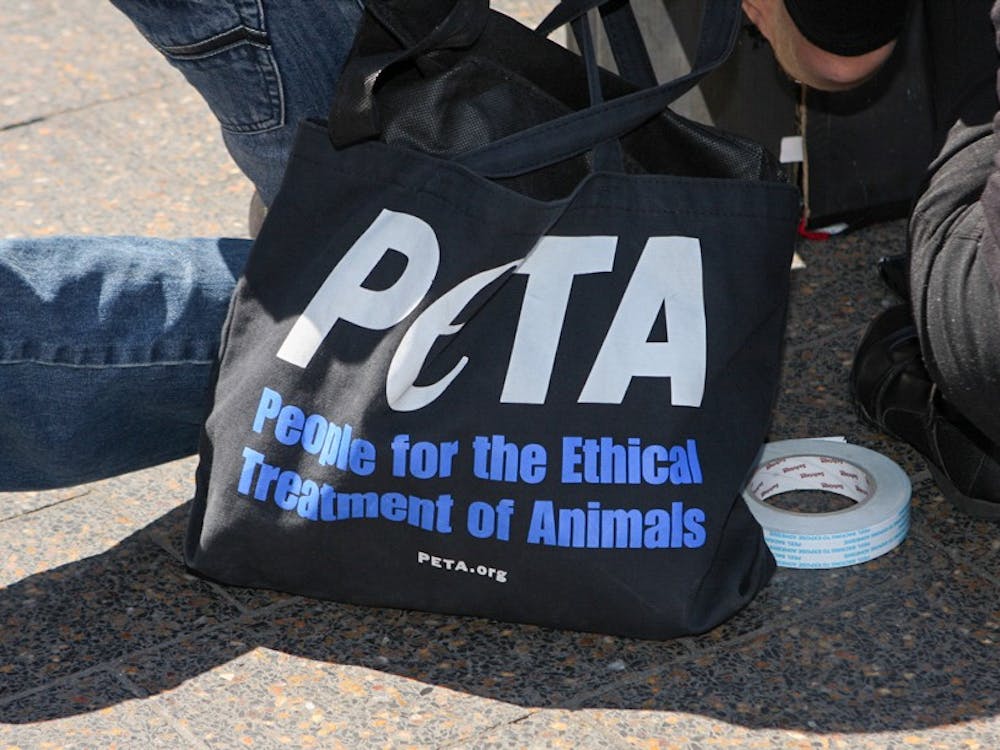Animal rights organization People for the Ethical Treatment of Animals ranked Duke among the worst schools in the country for animal testing, but Duke professors and students argued that the University meets ethical standards for research.
PETA’s new “Failed Tests” feature rates colleges and universities as “bad,” “worse” or “worst” in animal testing. Duke is in the “worst” category, along with dozens of other universities, including prestigious research institutions like Princeton, Yale, Stanford and the University of North Carolina at Chapel Hill.
Michael Schoenfeld, vice president for public affairs and government relations, wrote in an email to The Chronicle that Duke has “a rigorous process in place to ensure that all animal-related research adheres to the highest standards set by the U.S. Department of Agriculture, the National Institutes of Health and [Association for Assessment and Accreditation of Laboratory Animal Care] International,” the latter of which is an organization that accredits universities for treating animals humanely.
Schoenfeld wrote that Duke’s Institutional Animal Care and Use Committee (IACUC) reviews all animal-related research in advance and monitors it while it is in progress, along with “veterinary and other professional staff” in the Division of Laboratory Animal Resources.
The IACUC, according to its website, is charged with “overseeing and routinely evaluating” the Duke Animal Care and Use program through “the evaluation of the care, treatment, housing and use of animals.”
PETA rates schools based on the number of Animal Welfare Act (AWA) animals used, funding for animal research from the National Institute of Health and violations of animal-safety regulations, PETA project manager Kenneth Montville wrote in an email to The Chronicle.
Taking these three factors into account, PETA uses a formula to give each school a rating score, which Montville described as the sum of the “number of AWA covered animals divided by 1,000,” “funding dollars divided by 5 million” and “the number of violations with various multipliers depending on severity.”
Schools that receive any funding or use any animals for testing—with the exception of mice, rats and birds—are labeled “bad,” schools with more than two points are labelled “worse” and schools with more than 25 points are labeled “worst.”
Duke’s score was 129. In an email to the Chronicle, PETA media manager Tasgola Bruner wrote that Duke used 1,213 animals, received $475 million in NIH funding and had two violation reports.
The schools with the most points include Oregon Health Science University with 227 points, the University of California San Francisco with 181 and Johns Hopkins with 173, Montville wrote in an email. Duke has the 11th-highest score and the University of Michigan and the University of Washington are tied for no. 9, he added.
"The purpose of our campus cruelty report is to pull back the curtain on this abusive industry and to get students thinking about the cruelty that happens behind closed doors and these windowless building on their own campuses,” Montville told The Chronicle.
The broader aspect of PETA’s mission is to combat speciesism, the idea that the human species is more valuable than others, Montville said. He said the group argues that speciesism is the reason humans believe it is morally justified to experiment on animals for the benefit of humankind.
PETA also argues that animal testing is not useful in finding treatments for humans. The group claims that that more than 90% of research resulting from animal testing fails in the human-treatment phase.
However, UK-based nonprofit Understanding Animal Research argued in 2013 that animal rights groups have taken this statistic out of context, as animal testing helps ensure that drugs have therapeutic potential and are safe to test in humans.
Montville said that animal testing is an outdated approach, wasting limited research dollars and preventing researchers from acquiring information that is actually relevant to human patients.
Two Duke students said that Duke follows ethical guidelines in research.
Senior Rebecca Lee, a research assistant studying the development of glands in mice, said that Duke is extremely strict when it comes to following protocol. The mice in the lab where Lee works are constantly monitored to ensure their good health, she said, and lab veterinarians are readily available when health concerns arise.
Sophomore Sachin Jaishankar, who works with mice to study the role of exercise therapy in treating Alzheimer’s Disease, said that he went through mandatory training before working with the mice. Students must learn how protocols on euthanasia, transporting animals, housing animals and more, Jaishankar said.
Animal testing may also provide significant research information, Lee and Jaishankar said.
“There is a lot of genetic testing, and there are genetic similarities across species,” Jaishankar said.
Get The Chronicle straight to your inbox
Sign up for our weekly newsletter. Cancel at any time.
For example, he said that mouse studies provide a “direct scalable way” to model Alzheimer’s in humans.
Jaishankar said that, although there are in vitro models, what happens in a petri dish or computer model is not representative of what happens in the human body. Computer models can be a prerequisite for animal testing, he said, but not a replacement for real-world application.
Correction: An earlier version of this article incorrectly referred to Jaishankar as “he” instead of “she.” The Chronicle regrets the error.

